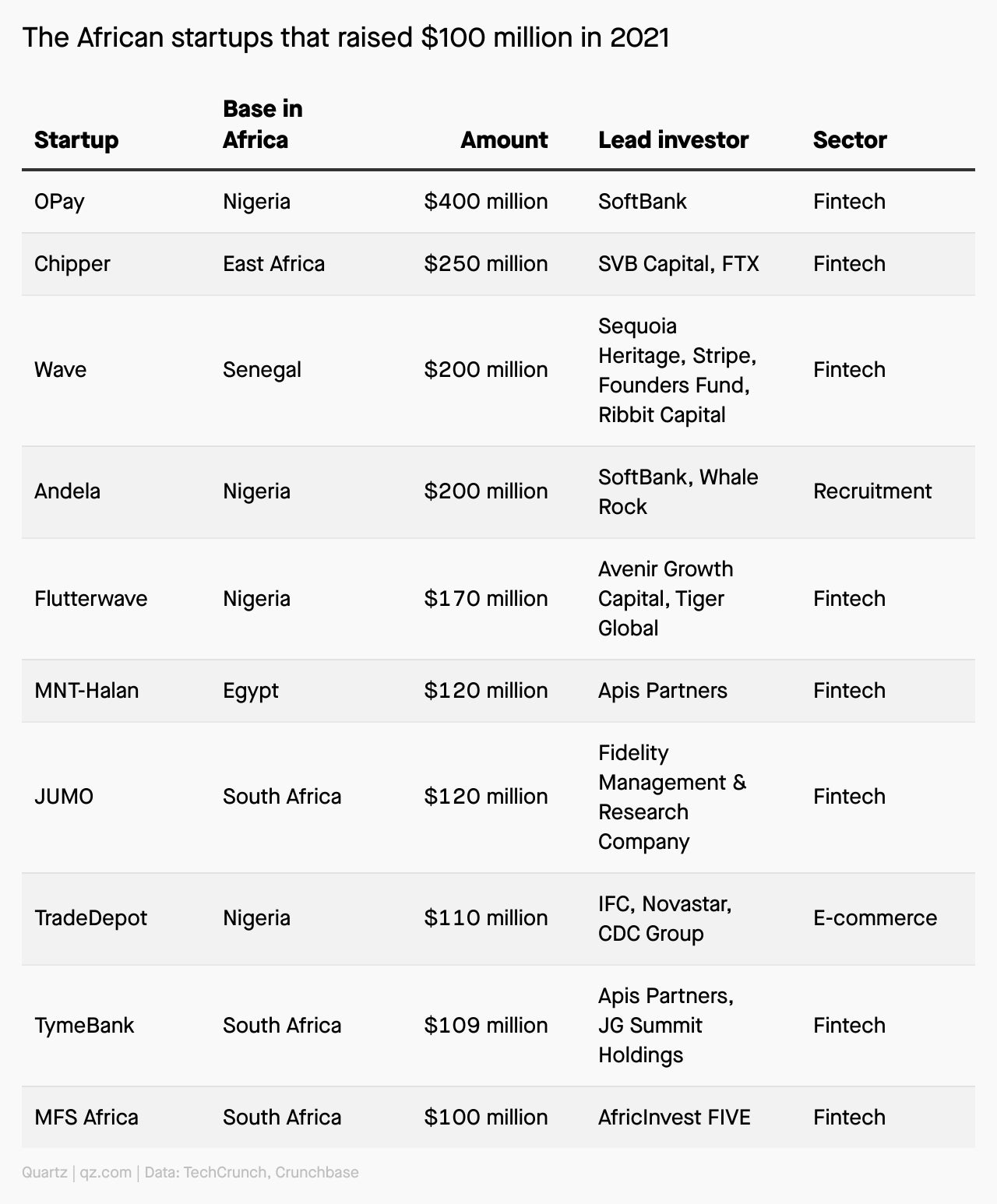2021 in review
Hi Quartz Africa readers!


Hi Quartz Africa readers!
2021 was an important year for all of Quartz, as we began work on our revamped mission to “make business better.” For Quartz Africa, it was a year of substantial change, with a new editor and a fresh team of reporters covering the continent.
Our truly global newsroom came into its own in a year of continuing travel restrictions and remote work, making our ability to tap into knowledge and experience beyond Africa even more useful and important.
Looking back at 2021, here are some of the milestones we hit, and some of what captured Quartz Africa’s attention over the past 12 months.
Startups
We looked at the impact of startups we’ve been following for ages…
- Jumia’s average order size is falling because of a change in strategy
- Zipline needs Nigeria to support its drone delivery medical service—as Rwanda and Ghana did
- A $2 billion fintech startup has become Africa’s fastest unicorn
- What has Paystack done one year after joining Stripe?
- Why Morgan Stanley’s new Jumia analyst downgraded the African e-commerce firm
- A founder who’s been pivotal to the Nigerian startup scene will sell her company for $320 million
- What tech hubs have achieved in Africa in the last decade
…but we also told the stories of new enterprises…
- A new Pinterest-like app is curating pretty places into a global social network
- Nestcoin is a former Binance director’s plan to make crypto in Africa mainstream
- Lemonade Finance is doing what PayPal has failed to do for Africa’s diaspora
- An edtech startup’s pivot suggests African parents want livestreamed lessons
- This startup is trying to digitize Africa’s pharmaceutical supply chain
- The inside story of how an ambitious African cryptocurrency startup failed
…and what else affected business and innovation on the continent
- Africans’ favorable view of China comes with one small caveat
- How Africa could become a world leader in central bank digital currencies
- How logistics startups could make Africa’s largest free trade area work
- Secret contracts show how China structures loans to become Africa’s “preferred” lender
- Why are African countries supporting the IMF’s Kristalina Georgieva?
- Why Kenya and Nigeria haven’t agreed to a historic global corporate tax deal
We had fun doing it!
And we surprised you too
- Why African countries are against Israel’s new African Union role
- The highest-grossing film in South Korea this year is a true story set in Somalia
- How Ugandan is Oscar-winner Daniel Kaluuya?
- How do Nigerians identify with England soccer hero Bukayo Saka?
- Akon wants to run a Senegal city on cryptocurrency—could it work?
Ecosystem
The normalization of African startups raising $100 million
2021 was the year when African startups normalized raising $100 million. TymeBank and Flutterwave opened the gates in the first quarter. Chipper did it twice in six months. Wave put an overlooked sub-region on the map.
In 2021, these and six other tech companies each raised at least $100 million in different rounds to herald a new regime of “mega-round” startup funding in Africa. The 11 deals they closed were worth more than $1.7 billion, accounting for more than 40% of the $4.2 billion African startups have (so far) raised in 2021, according to The Big Deal, a startup funding database.
No African startup raised $100 million in 2020. Indeed, except the buzzy acquisitions of Paystack and Sendwave, last year was marked by fears of investor apathy towards Africa. As the pandemic ravaged economies, there was some anxiety that western investors would retreat, focusing rainy-day funds on less risky, developed markets.
But 2021’s rush of African mega rounds (as $100 million raises are sometimes called in Silicon Valley) suggests those fears did not materialize. Instead, old and new investors raised the stakes with their biggest bets yet.

Innovators
For the first time, the Quartz Africa Innovators’ series entirely focused on identifying some of the most ambitious and imaginative women on the continent. The 2021 list, our sixth edition, highlighted female artists, activists, investors, and entrepreneurs whose innovations are helping their communities, countries, and the continent through a challenging period.
More than two dozen women, representing 18 countries and a diverse range of sectors, represent the dynamism, entrepreneurial drive, and resilience of millions on the continent. Their innovations demonstrate the potential that can be unleashed when women with bold ideas and decisive actions take the lead.
The pandemic
We contextualized the evolving pandemic…
- Europe sent Nigeria up to 1 million near-expired doses of covid-19 vaccine
- The African countries that are expected to meet the WHO’s end-year vaccination target
- Why mass vaccine donations to Africa aren’t working
- The UK is scrapping its “red list” of restricted travelers from Africa
- Africa’s CDC explains how a vaccine waiver would help its lagging rollout
- The best explanation yet of why Covax is failing Africa
- Why Africa doesn’t have its own covid-19 vaccine
…and also explored the various ways it changed our economies
- Why Omicron isn’t sending South Africa back into strict lockdowns
- Sub-Saharan Africa is projected to recover slowest from the covid-19 pandemic
- How tech and agriculture can help Africa’s pandemic recovery
What you enjoyed reading
Top stories of the year
- The last country on Earth using leaded gasoline just finished its supply
- Nigeria’s awful Tokyo Olympics made Puma cancel a $2.7 million deal
- Why has covid-19 had less of an impact in Africa?
- Bitcoin is wooing the millions of workers who send their earnings abroad
- A Senegal-born factory worker is Europe’s first TikTok megastar
- Kenya becomes the second African country to roll out 5G
- Why you’re not hearing about covid-19 outbreaks in Africa
- A white founder’s $1 million Nairobi food startup aims to fix a problem Kenyans say doesn’t exist
- China is getting worried about Africa’s indebtedness to it
- Why a Nobel laureate is backing Bobi Wine’s bid to be Uganda’s president
- How the language of the Edo people of Nigeria made its way into Portuguese creole
- A Nigerian internet scammer is becoming an action-movie villain
Reader picks
My favorite story this year was one on Ghana issuing a social bond. I am interested in coverage that promotes or advertises financial and technological advancement on the continent. Thanks for your good work!—Quartz Africa reader
Editor picks
I loved reading How economic sanctions drove money transfers in west Africa underground. Hawala was a new concept to me, as a reader, and I loved learning about the practice and thinking about parallels in modern finance. I also enjoyed reading Retail trading apps in Nigeria face a defining moment—while Robinhood gets all the attention, this was a great look at not only its African competitors but how various African economies affect the market for retail trading on the continent.—Zach Seward, chief executive officer and a co-founder of Quartz
My favorite is A white founder’s $1 million Nairobi food startup aims to fix a problem Kenyans say doesn’t exist, because it so perfectly captures a certain kind of presumptuous overconfidence, a cross between a white tourist’s misinterpretation of a new city and a white tech entrepreneur’s blind belief in the novelty of his idea. The fact that the unproven problem at hand is related to local food just increases the drama. The story expertly pans out to become an indictment of the racial inequity at play in Kenya’s startup scene.—Katherine Bell, Quartz editor-in-chief
My top story of the year was on Akon’s plan to run a city in Senegal on cryptocurrency. This story sits right at the intersection of hype and possibility, which is where crypto itself lived for much of this year. By digging into Akon’s vision, we get a sense of the real advantages and pitfalls of crypto (and have to admit that “Akoin” is a pretty good name.)—Kira Bindrim, Quartz executive editor
Thank you for joining us on the fascinating trip that was 2021. Have an informed end to your year. —Quartz Africa team
If you received this email from a friend or colleague, you can sign up here to receive the Quartz Africa Weekly Brief in your inbox every week. You can also follow Quartz Africa on Facebook.